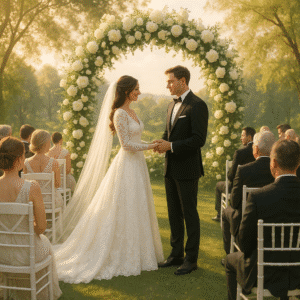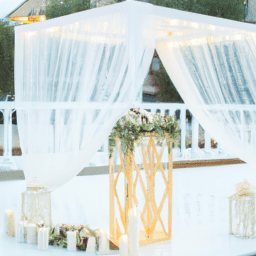
Is White Wedding In The Bible?
Is White Wedding In The Bible? Imagine if you could uncover a hidden treasure hidden within the pages of the Bible – something that has intrigued many for centuries. Well, get ready for an enlightening journey as we explore the question: “Is White Wedding in the Bible?” Delve into the fascinating world of ancient customs and traditions as we decipher the true origins of the white wedding gown and its significance in the biblical context. Embark on this captivating exploration and prepare to discover the intriguing secrets that lie within the scriptures.
Biblical Wedding Traditions
Marriage holds significant importance in the Bible, considered a sacred and lifelong commitment. In biblical times, weddings were seen as joyous occasions, symbolizing unity and the creation of a new family. The institution of marriage is honored, as evidenced by various stories and teachings throughout the Bible, such as the creation of Adam and Eve in Genesis.
Wedding Customs in Ancient Israel
In ancient Israel, weddings were a highly anticipated celebration, steeped in tradition and cultural customs. These customs included betrothal, negotiation of the bride price, and the wedding ceremony itself. The betrothal period was a time of preparation, usually lasting about a year, during which the groom would prepare a place for his bride. The negotiation of the bride price, often paid to the bride’s family, served as a symbol of commitment and honor.

Symbolism in Biblical Weddings
Biblical weddings were rich in symbolism, with various elements representing deeper meanings. For example, the exchange of rings symbolized the unending circle of love and commitment. The breaking of bread together during the wedding feast symbolized unity and sharing. The use of wine in the ceremony represented joy and abundance. These symbolic actions conveyed the profound spiritual and emotional significance of the marriage covenant.
White Wedding Origin and Meaning
Introduction to White Wedding
The concept of a white wedding, characterized by the bride wearing a white gown, has become a popular tradition in many cultures. It is often associated with purity, innocence, and a new beginning. While the specific origin of the white wedding tradition is unclear, it has been widely embraced and continues to hold great significance in modern-day weddings.
Evolution of White Wedding
The white wedding tradition has evolved over time, influenced by cultural shifts and societal norms. It gained prominence during the Victorian era when Queen Victoria chose to wear a white gown for her own wedding in 1840. This decision sparked a trend that spread throughout Europe and eventually to other parts of the world. The white wedding gown became a symbol of elegance, wealth, and social status.
Significance of White Wedding
The white wedding tradition holds deep symbolism beyond its aesthetic appeal. It represents purity, not only in a moral sense but also as a fresh start and a commitment to a new life together. The color white is associated with light, goodness, and holiness in various religious and cultural contexts, making it a fitting choice for such a sacred and joyous occasion.
Symbolism of Colors
Colors play a significant role in biblical symbolism, carrying spiritual and metaphorical meanings. Red symbolizes blood, sacrifice, and redemption. Blue represents divinity, heaven, and the presence of God. Yellow or gold signifies purity, divinity, and glory. Green symbolizes growth, fertility, and renewal. Understanding the symbolism of colors helps us grasp the deeper significance of various biblical passages and rituals.
Color References in the Bible
The Bible contains numerous references to colors, each carrying its own symbolic meaning. For example, the Book of Exodus describes the use of specific colors in constructing the tabernacle and priestly garments, highlighting their importance in religious rituals. The color white is often associated with purity, righteousness, and divine presence. These color references provide further insight into the symbolic significance of white in biblical contexts.
White Symbolism in Christianity
White holds great symbolism in Christianity, representing purity and virtue. It reflects the belief in the cleansing power of God’s forgiveness and the desire to live a life free from sin. Just as a white garment is unstained, Christians aspire to live morally upright lives, reflecting the inner transformation brought about by their faith.

Baptism and New Beginnings
In Christian baptism, white garments are often worn to symbolize the washing away of sin and the newness of life in Christ. The act of being submerged in water and rising out of it represents a spiritual rebirth and the beginning of a transformed life. The color white captures the essence of this new beginning, signifying purity and a fresh start in one’s journey of faith.
Redemption and Salvation
White is also associated with redemption and salvation in Christian theology. The grace of God, symbolized by the purity and perfection of white, enables believers to be reconciled with God and obtain eternal life. White robes are often depicted in biblical imagery of heavenly realms, representing the ultimate victory over sin and the attainment of a restored relationship with God.
Wedding Attire in the Bible
Traditional Clothing in Ancient Times
In biblical times, wedding attire varied depending on the culture, social status, and traditions of the region. The choice of clothing for weddings was often rich in cultural symbolism, reflecting the values and customs of the community. The attire ranged from simple garments made from local materials to elaborate robes adorned with precious jewels and ornaments, particularly for royal weddings.
Symbolic Attire in Biblical Weddings
The clothing worn during biblical weddings often carried symbolic meaning. For example, the bride’s veil symbolized modesty, purity, and the separation from her previous life. It also represented the groom’s anticipation and eagerness to uncover his bride’s beauty on their wedding day. The groom’s attire, on the other hand, symbolized strength, dignity, and readiness to protect and provide for his new family.
White Wedding Gowns in the Bible
While there is no direct mention of white wedding gowns in biblical texts, the concept of purity and symbolism associated with white aligns with the overall values and themes present in the Bible. The choice of a white wedding gown is a personal and cultural tradition influenced by interpretations of purity, new beginnings, and the sacred nature of marriage.
Marriage Celebrations in the Bible
Feasting and Rejoicing
Marriage celebrations in the Bible were marked by feasting and rejoicing. They were occasions of great joy and festivity, with friends, family, and the entire community coming together to honor and bless the newlyweds. The celebration was not limited to a single day, and it often extended for several days, providing ample time for communal bonding and shared happiness.
Wedding Banquets in Biblical Times
Wedding banquets held a special place in biblical wedding celebrations. They were elaborate feasts, serving as a memorable showcase of hospitality and abundance. The provision of ample food and drink represented the couple’s readiness to provide for their future family and their commitment to a life filled with blessings. The communal nature of the banquet emphasized the importance of unity and shared joy during this significant occasion.
Cultural Influences on Wedding Traditions
Christian Wedding Traditions
Christian wedding traditions have been influenced by various cultural practices and historical contexts. While the Bible provides guidance on the nature and sanctity of marriage, specific wedding customs have developed based on regional traditions and societal norms. These traditions often incorporate elements of symbolism and meaningful rituals, aiming to reflect the values and beliefs of the couple and their faith community.
Incorporation of White Wedding
The white wedding tradition gradually became incorporated into Christian weddings over time, particularly in Western cultures. As the symbol of purity and new beginnings, the white wedding gown echoed the Christian ideals of a pure and committed union. This incorporation allowed couples to express their faith, personal values, and cultural identity in a modern context while honoring the sacredness of marriage.
Modern Influence on Wedding Customs
In the modern era, wedding customs have evolved with changing societal norms and cultural practices. Couples often personalize their weddings to reflect their unique identities, incorporating elements that hold personal significance to them. While the white wedding tradition continues to be popular, weddings now encompass a wide range of expressions, blending various cultural and religious influences to create meaningful experiences for the couple and their loved ones.
Misconceptions about White Wedding in the Bible
Misinterpretation of Scripture
Some individuals argue that the white wedding tradition lacks biblical foundation, attributing it to a misinterpretation or absence of explicit references in the Bible. It is essential to recognize that specific cultural customs, such as the white wedding gown, may not have been explicitly mentioned in biblical texts. However, this does not diminish the significance and meaningfulness that these traditions hold for individuals and their faith.
Historical Context and Cultural Shifts
The absence of direct references to white weddings in the Bible can be attributed to historical context and cultural shifts. Weddings and wedding traditions, including the choice of attire, have evolved over time in response to changing cultural norms and societal practices. The white wedding tradition emerged as a reflection of cultural and social shifts, embracing new meanings and symbolism that resonate with couples and their communities.
Alternative Interpretations
Different Perspectives of Religious Scholars
Religious scholars offer a range of interpretations concerning the absence of explicit references to white weddings in the Bible. Some argue that while the tradition may not have a direct biblical basis, it is valuable as a cultural expression of faith and commitment. Others emphasize the importance of focusing on the underlying principles and values conveyed by the Bible rather than specific rituals or traditions.
Interpreting Symbolism in Weddings
The absence of white wedding references in biblical texts should not discourage individuals from seeking symbolism and meaning within their own wedding traditions. The white wedding tradition can be understood as a personal and cultural expression of purity, faith, and new beginnings, aligning with the broader themes of love, commitment, and the sanctity of marriage that the Bible promotes.

Personal Interpretations
Ultimately, the interpretation and significance of white weddings in the Bible are personal and subjective. Couples and families may choose to embrace the white wedding tradition, recognizing the deeper symbolism and personal meaning it holds for them. While individual interpretations may differ, what remains paramount is the commitment to a lifelong partnership based on love, respect, and shared values, which are at the core of biblical teachings on marriage.
10 FAQs on weddings in the Bible
1. What does the Bible say about marriage?
The Bible describes marriage as a sacred covenant between a man and a woman, instituted by God, and meant to reflect the relationship between Christ and the Church (Ephesians 5:25-33).
2. Was there a specific wedding ceremony in biblical times?
Yes. Biblical weddings typically involved a betrothal period, followed by a formal ceremony with a feast. The groom would take the bride to his home, often preceded by a joyful procession.
3. Who performed weddings in the Bible?
Weddings in the Bible were family and community events, often led by the head of the household or local elders. Priests weren’t typically the ones performing ceremonies as seen today.
4. Is there a famous wedding story in the Bible?
Yes, the Wedding at Cana (John 2:1-11) is famous for being where Jesus performed His first miracle—turning water into wine—signifying the importance and blessing of marriage.
5. What was the purpose of marriage in the Bible?
Marriage in the Bible was for companionship, procreation, and the foundation of family. It also served to illustrate God’s covenant relationship with His people.
6. Were arranged marriages common in the Bible?
Yes. Most marriages were arranged by families to secure alliances, preserve heritage, or follow divine guidance, as seen in Isaac and Rebekah’s story (Genesis 24).
7. What role did dowries play in biblical weddings?
Dowries, or bride prices, were common and symbolized a man’s commitment. They were given to the bride’s family as part of the marriage agreement.
8. Did biblical weddings include vows?
While not always detailed, some form of agreement or covenant was made. The concept of vows is implied through commitments and blessings given during the wedding.
9. What are the biblical qualifications for marriage?
Biblically, marriage was between one man and one woman, requiring mutual consent, faithfulness, and alignment in faith and values (2 Corinthians 6:14).
10. Is the Church referred to as a bride in the Bible?
Yes. The Church is called the “Bride of Christ,” especially in Revelation 19:7-9, symbolizing purity, devotion, and an eternal union with Jesus.
Conclusion
While the specific reference to white weddings may not be found in the Bible, the symbolic meaning of white, purity, and new beginnings aligns with the values and themes present in biblical teachings. Wedding traditions, including the choice of attire, have evolved over time to incorporate various cultural influences and express personal faith and identity. It is crucial to remember that the essence of a wedding is not solely about external rituals or traditions, but rather the commitment and love shared between two individuals, blessed and celebrated by their friends, families, and communities.







